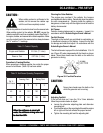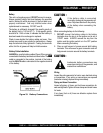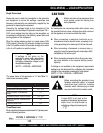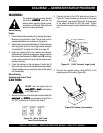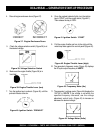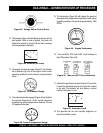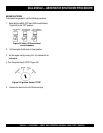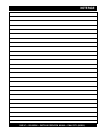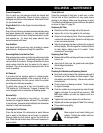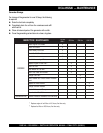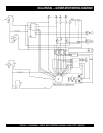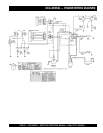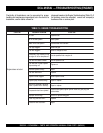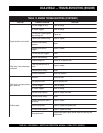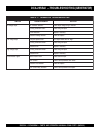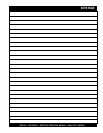
PAGE 48 — DCA-25SSAI — PARTS AND OPERATION MANUAL—FINAL COPY (06/30/01)
DCA-25SSAI — MAINTENANCE
General Inspection
Prior to each use, the generator should be cleaned and
inspected for deficiencies. Check for loose, missing or
damaged nuts, bolts or other fasteners. Also check for fuel,
oil, and coolant leaks.
Engine Side (Refer to the Engine Instruction Manual)
Air Cleaner
Every 50 hours: Remove air cleaner element and clean heavy
duty paper element with kerosene, or foam element with
liquid detergent and hot water. Wrap foam element in a cloth
and squeeze dry. For heavy duty paper element, wipe
excess kerosene with towel.
Fuel Addition
Add diesel fuel (the grade may vary according to season
and locations). Always pour through the mesh filter.
Removing Water from the Fuel Tank
After prolonged use, water and other impurities accumulate
in the bottom of the tank. Occasionally remove the drain
cock and drain the contents. During cold weather, the more
empty volume inside the tank, the easier it is for water to
condense. This can be reduced by keeping the tank full as
much as possible.
Air Removal
If air enters the fuel injection system of a diesel engine,
starting becomes impossible. After running out of fuel, or
after disassembling the fuel system, bleed the system
according to the following procedure.
To restart after running out of fuel, turn the switch to the
“ON” position for 15-30 seconds. Try again, if needed. This
unit is equipped with an automatic air bleeding system.
Service Daily
If the engine is operating in very dusty or dry grass
conditions, a clogged air cleaner will result. This can lead to
a loss of power, excessive carbon buildup in the combustion
chamber in high fuel consumption.
Cleaning the Fuel Strainer
Clean the fuel strainer if it contains dust or water. Remove
dust or water in the strainer cap and wash it in gasoline.
Securely fasten the fuel strainer cap so that fuel will not
leak. Check the fuel strainer every 200 hours of operation or
once a month.
Check Oil Level
Check the crankcase oil level prior to each use, or when
the fuel tank is filled. Insufficient oil may cause severe
damage to the engine. Make sure the generator is level.
The oil level must be between the two notches on the dipstick
as shown in Figure 31, page 39.
Replacing Oil Filter
Detach the oil filter cartridge with a filter wrench.
Apply a film of oil to the gasket for the cartridge.
Screw in the cartridge by hand. When the gasket is in
contact with the seal surface, tighten the cartridge one
or two more times by hand.
After the oil cartridge has been replaced, the engine oil
will drop slightly. Run the engine for a while and check
for leaks before adding more oil if needed. Clean
excessive oil from engine.
Replacing Fuel Filter
Replace the fuel filter cartridge with new one every 400
hours or so.
Apply fuel oil thinly over the gasket and hand-tighten
the cartridge into position.
Vent any air.
Flushing Out Radiator and Replacing Coolant
Open both cocks located at the crankcase side and at
the lower part of the radiator and drain coolant. Open
the radiator cap while draining. Remove the overflow
tank and drain.
Check hoses for softening and kinks. Check clamps
for signs of leakage.
Flush the radiator by running clean tap water through
radiator until signs of rust and dirt are removed. DO
NOT clean radiator core with any objects, such as a
screwdriver.
Tighten both cocks and replace the overflow tank.
Replace with coolant (see page 40, Table 12 for mixture).
Close radiator cap tightly.
CAUTION :
Allow engine to cool when flushing out
radiator. Flushing the radiator while hot
will damage radiator.



